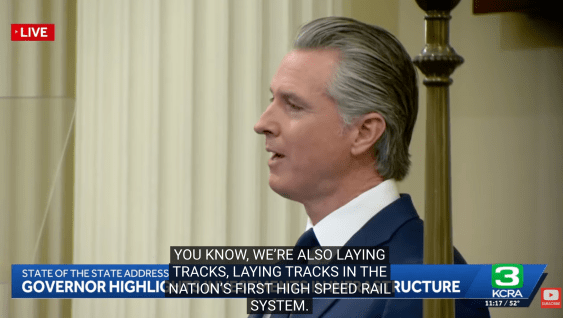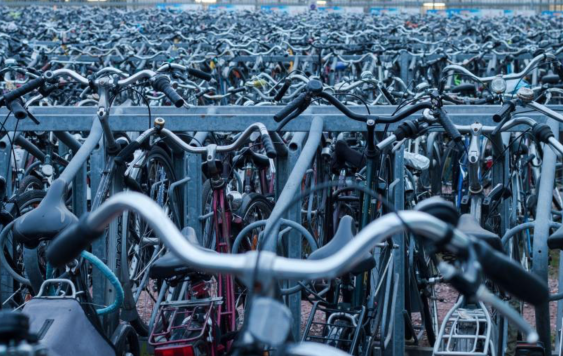Gov. Hochul’s “short-sighted” decision to eliminate the state’s tax on gasoline will have a large impact on the state’s air quality and congestion, yet was apparently not studied at all — even as the state continues an 18-month investigation into the supposed environmental impact of congestion pricing, which will reduce congestion and improve air quality.
The budget bill that eliminates the gas tax fortunately includes a clause that will reimburse the MTA for the tens of millions of dollars in revenue that the gas tax provides to transit — an earlier version of the bill left that reimbursement very much in doubt — but experts said that keeping the MTA whole is still unfair because that money will come from the general fund, not from revenue generated from drivers, who cause virtually all of the damage to roads and whose driving reduces fare revenue for transit.
But in the early hours of Friday, most experts were focusing on the irony of Hochul’s magic wand move.
“It’s a cruel irony that the governor’s gas tax holiday can be done with the stroke of a pen after a few nights’ negotiation and a rushed vote of the legislature while congestion pricing, authorized more than four years ago, is still undergoing painstaking federal regulatory review under the banner of environmental protection,” said Riders Alliance spokesman Danny Pearlstein.
Pearlstein also pointed out that reducing the burden on New York drivers “will enrich authoritarian billionaire oil tycoons from Charles Koch to Vladimir Putin” while congestion pricing, which is mandated to create $1.5 billion annually for transit would “help millions of New Yorkers get around more sustainably and reliably.”
New Yorkers are facing rising costs & deserve relief
But a gas tax holiday is not the way to do it
This subsidizes the fossil fuel industry by $585M — $85M more than we’re spending on offshore wind — amidst the climate crisis
This is not our way forward
I voted no pic.twitter.com/y3zIelMuns
— Zohran Kwame Mamdani (@ZohranKMamdani) April 8, 2022
As a dozen environmental and good government groups pointed out last month, eliminating the state’s 46-cent-per-gallon tax, roughly 37 percent of which goes to the public transportation and 63 percent funds the Highway and Bridge Trust Fund, ends up being a handout to wealthier drivers at the expense of transit users. Advocates have long argued that the percentages should be flipped, but that debate is now obviated by the elimination of the revenue entirely for the rest of the year.
Even the Daily News editorial board — certainly no card-carrying Green New Dealers — blasted the gas tax reprieve as “a foolish short-term stunt that robs investment in our transportation infrastructure, from roads, highways and bridges to subways, buses and commuter rail.”
Kate Slevin of the Regional Plan Association said she was “disappointed, to say the least.”
“The whole idea of a gas tax is that you pay for maintenance and repair of the roads drivers are driving on,” she said. “And in the urban areas of this state, those who can afford to own cars tend to be wealthier, so a gas tax holiday goes against equity and our environmental goals. Where will the revenue for our transportation system come from now? If you take it from the general fund that means other worthy projects don’t get funded.”
So this doesn’t need an 18-month environmental impact study but congestion pricing – which would directly reduce emissions by shifting car trips to public transit – does? https://t.co/oJHGDW5qOE
— Katherine Nessel ??? (@KatherineNessel) April 7, 2022
Even at just a 37-percent share, the gas tax meant $400 million in revenue for the MTA. Even though the MTA will be reimbursed, journalists were eager on Friday to revisit what MTA CEO Janno Lieber said on March 16 when asked if his agency supported the elimination of the gas tax: “It’s $400 million the first year if we were to lose the gas tax for the MTA. And equally important, the gas tax secures some specific bonds, there are specific bonds secured by the petroleum business tax.”
Clayton Guse of the Daily News suggested that it’s a bad look, optics-wise:
Hochul last year froze an MTA fare hike, just pushed through a holiday on gas taxes, which the agency uses to secure bonds.
MTA officials say they're able to replace gas tax $ and don't need the fare hike.
But history casts a jaundiced eye on govs who politicize MTA revenues.
— Clayton Guse (@ClaytonGuse) April 8, 2022
Eric McClure of StreetsPAC, which also signed the advocates’ letter last month, added, “There’s only one bad kind of holiday, and that’s a gas-tax holiday.”
“It does nothing to help low-income, working-class New Yorkers who rely on public transit to get around, and even if the MTA will be made whole from the general fund for lost tax revenues, those are dollars that could be targeted to other areas of far greater need,” he said. “A gas-tax holiday is bad environmental policy, it’s bad economic policy, and it’s bad transportation policy. If anything should have to go through a lengthy environmental review, it’s suspension of gasoline taxes.”
But that’s politics.
“This is an election-year move,” said Rachael Fauss of Reinvent Albany, which has opposed the gas tax holiday. “Upstate lawmakers have a very different sense of this issue. They believe it will help their constituents. But the whole point of the gas tax is that the people who use gas are the ones who pay for transit and road and bridge repairs because the act of buying gas has a negative impact on those things. Taking that money from the general fund means the money is coming from income taxes, not on a tax on the users of gas. So that means everyone is now paying for road upkeep, even people who don’t drive a car, which is a core equity issue.”
Worse, the decision to cut the gas tax undermines the MTA’s argument that it needs more, not less, dedicated streams of revenue, Fauss added.
“The MTA has said it needs more dedicated revenue to set them up for when the federal aid runs out,” she said. “And a logical source of that is fossil fuel taxes. Once you put in a tax break, it’s hard to see the state putting in place more taxes.”
There’s a larger irony, of course. State officials have long issued statements demanding speedy action on climate change and, indeed, the state has an ambitious goal to eliminate carbon from electrical production by 2040 and to be entirely carbon neutral by 2050. Those goals get harder to reach if people are encouraged to drive and transit is not properly funded.
“There state has clear targets for greenhouse gas reduction, but projects that align with that goal — such as congestion pricing — get bogged down in regulation,” Slevin said. “There are some fundamental things we have backwards to reach these goals. It should not take so long to put in bus lanes or to expand the bike network, for example. These processes need to be faster if we are going to give people real alternatives to the car. Time is ticking. We all know it. And yet we make these short-sighted decisions that are not in line with the crises that we have identified over and over again.”
Liam Blank of the Tri-State Transportation Campaign focused on how little real impact the “stunt” has anyway.
“This is a political stunt, but it’s unlikely to significantly reduce the price at the pump,” he said. “Taxes make up only a small share of the total cost of gas. So, now Albany is robbing Peter to pay Paul, and it reeks of hypocrisy. You can’t tell us we must act aggressively to fight climate change and turn around and incentivize more driving. It just doesn’t add up.”
We asked the governor’s office a spate of questions:
- How much money will the gas tax holiday save New Yorkers?
- Was the expected increase in driving and the loss in revenue to the MTA studied in any “environmental impact” sort of way? If so, how?
- We have seen Gov. Hochul’s statement on the relief she is hoping to give, but can your office also comment on criticism that this gas tax holiday will have a negative impact on the state’s air quality and congestion?
- At a press conference in March, MTA Chairman and CEO Janno Lieber pointed out that the gas tax holiday would hurt the transit agency’s borrowing capacity as it tries to navigate around a future billion-dollar budget shortfall. “It’s $400 million the first year if we were to lose the gas tax for the MTA,” Lieber said on March 16. “And equally important, the gas tax secures some specific bonds, there are specific bonds secured by the petroleum business tax.” Can you comment on this?
We will update this story if we hear back.





